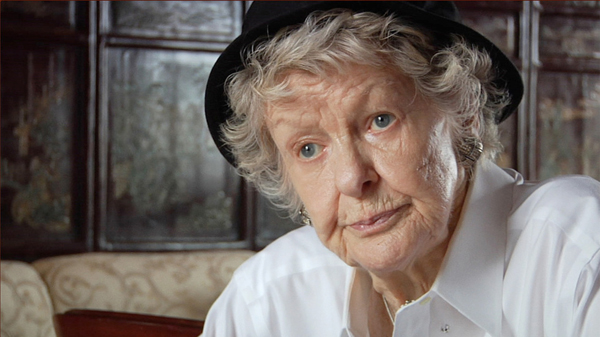![]() In the twilight of her career, veteran actress Elaine Stritch has won both an Emmy and Grammy for her 2002 one-woman Broadway show, Elaine Stritch at Liberty, her tell-all song and dish about this broad’s life on the boards. If she held back anything from her past, I’d be surprised: she’s matter-of-fact about her drinking, her imperfect judgment, and her regrets. Very little is left unscathed—including herself. Besides being an engaging biography stuffed with backstage stories, it was a pungent portrait of a working actor’s life, especially in the 1940s and 1950s. She debuted on the Great White Way in a little-known play, Loco, in 1946 and 25 years later was part of the groundbreaking Stephen Sondheim and George Furth musical Company.
In the twilight of her career, veteran actress Elaine Stritch has won both an Emmy and Grammy for her 2002 one-woman Broadway show, Elaine Stritch at Liberty, her tell-all song and dish about this broad’s life on the boards. If she held back anything from her past, I’d be surprised: she’s matter-of-fact about her drinking, her imperfect judgment, and her regrets. Very little is left unscathed—including herself. Besides being an engaging biography stuffed with backstage stories, it was a pungent portrait of a working actor’s life, especially in the 1940s and 1950s. She debuted on the Great White Way in a little-known play, Loco, in 1946 and 25 years later was part of the groundbreaking Stephen Sondheim and George Furth musical Company.
She is perhaps now more known outside the bright lights of Broadway for playing Alec Baldwin’s mother on 30 Rock; obstreperous is one word that comes to mind for her character, Colleen. But a better introduction, if one is necessary, is to watch any of her interviews on the late-night chat show Theater Talk (on New York public television and available on YouTube), where you’ll discover someone who revels as a raconteur. There are not too many that can keep up with her for wit, gossip, candor, and insight into show business.
Though her life’s story in her solo show has been filmed by HBO for all to see, Stritch remains a gift for a documentary filmmaker. It’s hardly an exaggeration to say that all a director needs to do is to just take the lens cap off, aim, and shoot, and Stritch will do the rest with no prompting (and sometimes wielding control of the direction when the camera is shooting from the wrong angle). Ever the trooper, she grabs the audience’s attention, which never wanes. There’s not one diffident moment. Elaine Stritch: Shoot Me is the natural-born sequel to her stage show and just as revealing. Director Chiemi Karasawa stays out of Stritch’s way, letting her run wild. We have Karasawa’s hairdresser, Piet Sinthuchai (one of the film’s associate producer), to thank for instigating the project; he introduced Karasawa to Stritch, one of his salon’s clients.
Timing is everything. As expected, there are several choice anecdotes (a chaste date with JFK), but Karasawa chooses to center her film on a quietly momentous decision in Stritch’s life: after living in Manhattan for 70 years, the 86-year-old is calling it quits, not long after she appeared with Bernadette Peters in A Little Night Music, to return to her family in Michigan.
Stritch allows Karasawa almost complete access, even on her bedridden days. Clear-eyed and forward looking, she acknowledges that her health is frail and she’s having more difficulty remembering lyrics, though Sondheim always accused her of making up the words anyway. Going out on her own terms, she has one last hurrah, her sold-out, farewell cabaret act at Café Carlyle. As she sees it, you might as well enjoy getting older, because there’s nothing you can do about it.
Stritch had earlier been scrutinized by D. A. Pennebaker’s 1970 observational film Company: Original Cast Album. In take after take, Stritch growls through a recording of “The Ladies Who Lunch” (a number that has become a staple in her repertoire) and struggles to focus. Not coincidentally, it was during this period of her career where booze gave her an extra shot of confidence, and you wonder if she’s, in fact, drunk or hungover. After 24 years of sobriety, she now permits herself one drink a day (but who’s counting?). Her unapologetic feelings about alcohol and the warmth it brings is intoxicating. You can vicariously taste the vodka. What would she like on a desert island? An open bar. But this is just one part of her storied life that becomes upstaged by footage of her in performance or simply strutting down a busy street.
After the film’s Tribeca Film Festival premiere, Stritch cut short a Q and A with typical bluntness, announcing, “I am hungry and I am tired and I want to go home.” No one argued with her. Incidentally, this film has won her seal of approval: “I loved it, I want to see it again, but I wouldn’t want to be in it.”







Leave A Comment